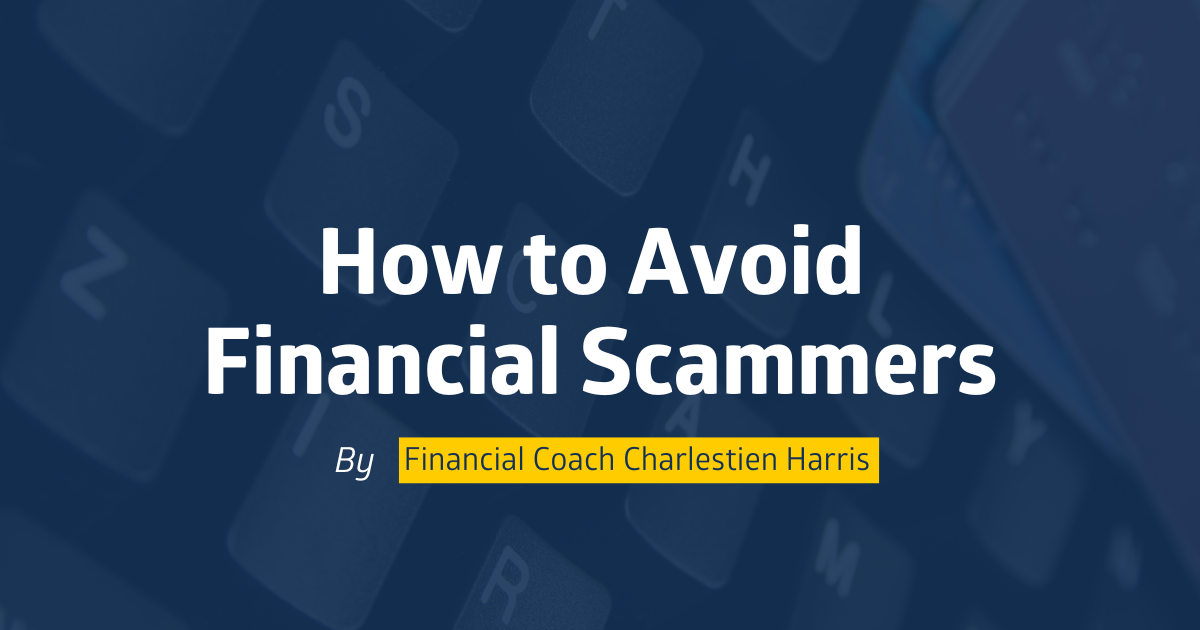By Charlestien Harris
One of the hottest months of the year is July, and the heat can be unbearable! Similarly, one of the hottest topics in the news is how often unsuspecting consumers are getting scammed, and the financial consequences can also be unbearable.
If you’ve been targeted by scams or fraud, you are not alone. With technology being as sophisticated as it is now and AI being able to replicate voices, sounds, and other materials, it can be virtually impossible to recognize the “real” thing. According to AARP, consumers lost over $10 billion to various schemes and fraudulent activities in 2023. It is getting harder and harder to detect fraud because it sounds and looks so real. Staying informed is one way to combat fraud and avoid falling victim to a scam. Knowledge gives you power over these bad actors.
Here are a few tips that may help you recognize and possibly avoid getting scammed, preventing financial ruin.
Four Ps that indicate a scam (and the solution):
- PRETENDING to be from an organization you know. They might use a real name, like the Social Security Administration, Internal Revenue Service, or Medicare, or make up a name that sounds official. Some pretend to be from a business you know, like a utility company or even a charity asking for donations.
- Solution: Always try to verify who you are speaking with. NEVER reveal any personal information over the phone or to a stranger without requiring some identification or official verification. Legitimate organizations will not call, email, or text to ask for your personal information, like your Social Security, bank account, or credit card numbers. Even if you get an email or a text message you think might be real, avoid clicking on any links. Instead, contact the sender using a website you know is trustworthy, or look up the number on an official website. Do not call a number they provide you with in a voicemail or the number from your caller ID.
- Creating a PROBLEM or claiming a PRIZE. They might say you’re in trouble with the government, you ignored a summons, or you need to pay a fine. Other examples include someone in your family having an emergency, a virus on your computer, or a problem with one of your accounts that requires verification. They may even claim you have won a prize and “all you need to do is…”
- Solution: If you have not entered a contest, raffle, or drawing, the chances of winning a prize are more than likely a scam. Do not send any money to claim a prize. Contact the agency or company that says you owe them to verify the debt. Ask for a supervisor’s name and call-back number. Chances are a scammer won’t want to provide you with that information. If they can’t give you a local number or address, hang up.
- Trying to PRESSURE you to act immediately. Scammers want you to act before you have time to think. If you’re on the phone, they might tell you not to hang up so you can’t check out their story or verify their information.
- Solution: Resist the pressure to act immediately. Legitimate businesses will give you time to make a decision or allow you to review actual contracts or agreements. Do not allow anyone to pressure you to pay or give them your personal information. If you feel pressured, just hang up, especially on a call that you did not initiate or were not expecting.
- Requiring PAYMENT in a specific way. They often insist that you can only pay by using cryptocurrency, wiring money through a company like MoneyGram or Western Union, using a payment app, or putting money on a gift card and then giving them the numbers on the back of the card.
- Solution: Never pay someone who insists that you can only pay with cryptocurrency, a wire transfer service, a payment app, or a gift card. Never deposit a check and send money back to someone. This happens quite often. We had a case just this week where our sharp tellers recognized the transaction as a scam and caught it before any financial harm could come to the customer. Use secure and traceable transactions.
Spotting or recognizing scams can become a full-time job, but as a consumer, you need to be aware of the deceptive practices scammers use to get you to part with your money. Some other resources you can use to help combat fraud are signing up for fraud or scam alerts. You can visit these websites to learn more: www.bbb.org/scamtracker; www.reportfraud.ftc.gov/. You can also report scammers and fraud attempts with AARP, BBB, and FTC on their respective websites.
For more information on this and other financial topics, you can email me at Charlestien.Harris@banksouthern.com, or call me at 662-624-5776.
Until next week – stay financially fit!
